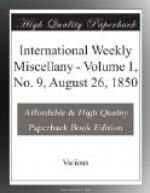and, as if ignorant of the novel circumstances with
which he was surrounded, went deeply into the matter
in hand, his election. For a while the audience
and the animals were quiet, the former listening,
the latter eyeing the speaker with grave intensity.
The first burst of applause electrified the menagerie;
the elephant threw his trunk into the air and echoed
back the noise, while the tigers and bears significantly
growled. On went Prentiss, and as each peculiar
animal vented his rage or approbation, he most ingeniously
wrought in its habits, as a facsimile of some man or
passion. In the meanwhile, the stately king of
beasts, who had been quietly treading the mazes of
his prison, became alarmed at the footsteps over his
head, and placing his mouth upon the floor of his cage,
made everything shake by his terrible roar. This,
joined with the already excited feelings of the audience,
caused the ladies to shriek, and a fearful commotion
for a moment followed. Prentiss, equal to every
occasion, changed his tone and manner; he commenced
a playful strain, and introduced the fox, the jackal,
and hyena, and capped the climax by likening some
well known political opponent to a grave baboon that
presided over the “cage with monkeys”;
the resemblance was instantly recognized, and bursts
of laughter followed, that literally set many into
convulsions. The baboon, all unconscious of the
attention he was attracting, suddenly assumed a grimace,
and then a serious face, when Prentiss exclaimed—“I
see, my fine fellow, that your feelings are hurt by
my unjust comparison, and I humbly beg your pardon.”
The effect of all this may be vaguely imagined, but
it cannot be described.
Of Prentiss’ power before a jury too much cannot
be said. Innumerable illustrations might be gathered
up, showing that he far surpassed any living advocate.
“The trial of the Wilkinsons” might be
cited, although it was far from being one of his best
efforts. Two young men, only sons, and deeply
attached as friends, quarreled, and in the mad excitement
of the moment, one of them was killed. Upon the
trial, the testimony of the mother of the deceased
was so direct, that it seemed to render “the
clearing of the prisoner” hopeless. Prentiss
spoke to the witness in the blandest manner and most
courtly style. The mother, arrayed in weeds,
and bowed down with sorrow, turned toward Prentiss,
and answered his inquiries with all the dignity of
a perfectly accomplished lady—she calmly
uttered the truth, and every word she spoke rendered
the defense apparently more hopeless.
“Would you punish that young man with death?”
said Prentiss, pointing to the prisoner.
The questioned looked, and answered—“He
has made me childless, let the law take its course.”
“And would wringing his mother’s heart
and hurrying her gray hairs with sorrow into the grave,
by rendering her childless, assuage your grief?”
All present were dissolved in tears—even
convulsive sobbing was heard in the courtroom.




